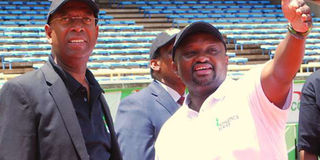Athletics Kenya CEO Mwangi takes leave to allow for graft probe

Safaricom CEO Bob Collymore with Athletics Kenya CEO Isaac Mwangi (right) during the launch of Safaricom's sponsorship for Kenya's athletics at the Safaricom Stadium, Kasarani on October 29, 2014. Mr Mwangi has been forced to take leave to pave way for investigations into bribery allegations levelled against him by two suspended Kenyan athletes, Joyce Sakari and Francisca Koki. PHOTO | FILE |
What you need to know:
- Joyce Sakari and Francisca Koki, who have been banned for four years as a result of doping in a pre-World Championships test last year, had accused Mwangi of asking for Sh 2.5m from them to facilitate the reduction of their bans.
- Mwangi has been under pressure to step aside since the news broke out of the alleged bribery.
- The two Kenyan athletes who are serving four-year doping suspensions claimed the chief executive of Athletics Kenya (AK), the country’s national governing body, requested $24,000 bribes to reduce their bans, according to The Associated Press.
- The IAAF confirmed that the allegations made by Koki and Sakari have been referred to its Ethics Commission.
Athletics Kenya (AK) chief executive officer Isaac Mwangi has taken leave to pave way for investigations into bribery allegations levelled against him by two suspended Kenyan athletes.
The move follows a meeting between the AK independent disciplinary committee and the Anti-Doping Agency of Kenya (Adak) officials in Nairobi on Tuesday.
"Mr Mwangi will proceed on leave for 21 days to pave way for investigations which will start on Monday," AK president Jackson Tuwei said.
Kenyan athletes Joyce Sakari and Francisca Koki, who have been banned for four years as a result of doping in a pre-World Championships test last year, had accused Mwangi of asking for Sh 2.5m from them to facilitate the reduction of their bans.
Long-serving AK administrative secretary Susan Kamau will take charge as the acting CEO until the investigations are concluded.
LEGAL PROCEEDINGS
Mr Mwangi has already said he will institute legal proceedings against the two athletes.
“These allegations are preposterous and the two athletes should be ready to face the consequences regarding their allegations,” said Mwangi, who has denied the accusations.
Mwangi has been under pressure to step aside since the news broke out of the alleged bribery.
The two Kenyan athletes who are serving four-year doping suspensions claimed the chief executive of Athletics Kenya (AK), the country’s national governing body, requested $24,000 bribes to reduce their bans, according to The Associated Press.
BANNED SUBSTANCE ABUSE
Koki and Sakari, who failed drugs tests during the IAAF World Championships in Beijing last August, told The Associated Press that Mwangi had asked for the money during a meeting on October 16, but the pair declined the payment as they could not afford it.
The pair, who were found to have the banned masking agent furosemide in their systems, suggested they would be prepared to give evidence to the IAAF Ethics Commission.
The IAAF confirmed that the allegations made by Koki and Sakari have been referred to its Ethics Commission.
The news follows the Ethics Commission’s decision in November to provisionally suspend three senior AK officials – president Isaiah Kiplagat, Vice-president David Okeyo and former treasurer Joseph Kinyua on suspicion of accepting bribes.
Kiplagat stands accused of accepting two cars from the Qatar Association of Athletics Federations during the bidding process for the 2019 World Championships which Qatar was awarded, while Okeyo is said to have siphoned off money from AK’s sponsorship agreement with sportswear giant Nike.
The trio have strongly denied any wrongdoing.





